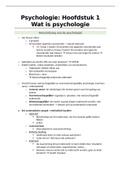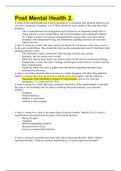ENGELS JUNI EXAMEN 2024: GRAMMATICA
ARTICLES (A, AN, THE, /)
- Indefinite article (“a” & “an”):
o Before nouns denoting jobs, professions & occupations (a
student)
Always “the” before CEO / president !
o As an alternative to ‘per’ (30kms an hour, 800€ a day)
- Definite article (“the”):
o Before a noun that refers to something specific and know to
the listener or reader
Mentioned before (I had a desktop but I sold the
desktop)
Shared knowledge (the cafetaria)
Before superlatives (the biggest)
Specified by a defining relative clause or an of-phrase
(the director of their latest film)
o To indicate a category of people or things (the poor, the mobile
phone)
o Before some names of institutions, countries & geographical
names (the IMF, the Netherlands, the Pyrenees)
o With musical instruments (She plays the piano)
- No article:
o Before most proper names (Central Station)
o With uncountable nouns (success, breakfast, happiness,
employment)
o With superlatives after linking verbs
ADJECTIVES AND ADVERBS
- Adjectives: to say something more about (pro)nouns (old, economic,
tired)
o Adjectives to talk about yourself: energetic, excited, relaxed,
calm, enthusiastic, inspired, practical, ambitious, hard-
working, serious, patient, extrovert, competitive, creative,
cheerful, alert
- Adverbs: to modify or give extra info about verbs, adjectives, other
adverbs or entire clauses (quite, economically, at last, of course)
, o Adverbs to talk about yourself: enthusiastically, creatively,
cheerfully, competitively, inspiring, ambitiously, seriously,
patiently, practically
o Never put an adverb between the verb and the object !
- Negative forms: use prefixes like dis-, il-, im-, in-, ir-, mis- & un-
VERB PATTERNS : VERB + VERB PATTERNS
- Verb (+ object) + ing form: She imagined (the man) winning the
election
- Verb + ing form / inf. (no difference in meaning): Omar attempted to
draft / drafting a presentation
- Verb + ing form / inf. (difference in meaning !): He stopped to smoke
(= He stopped with his work to go smoking) vs. He stopped smoking
(= He has never done it afterwards)
PRESENT AND PAST TENSES
- Past simple:
o Form: inf. + -ed (we worked)
o Use: completed actions and events in what is clearly past
o Common combinations: ago, last year/month/week, yesterday,
the other day/week, [date], when, just as, while
o Pay attention: irregular past forms
- Past continuous:
o Form: past simple of “to be” + ing-form of main verb (we were
working)
o Use: focus on temporary nature or changing/developing
actions or events
- Past perfect (simple):
o Form: past simple of “have” + past participle of main verb (we
had worked)
o Use actions, events and situations before a time in the past
- Past perfect continuous:
o Form: past perfect of “to be” + ing form of main verb (we had
been working)
o Use: focus on development/change before a time in the past
- Present perfect (simple):
ARTICLES (A, AN, THE, /)
- Indefinite article (“a” & “an”):
o Before nouns denoting jobs, professions & occupations (a
student)
Always “the” before CEO / president !
o As an alternative to ‘per’ (30kms an hour, 800€ a day)
- Definite article (“the”):
o Before a noun that refers to something specific and know to
the listener or reader
Mentioned before (I had a desktop but I sold the
desktop)
Shared knowledge (the cafetaria)
Before superlatives (the biggest)
Specified by a defining relative clause or an of-phrase
(the director of their latest film)
o To indicate a category of people or things (the poor, the mobile
phone)
o Before some names of institutions, countries & geographical
names (the IMF, the Netherlands, the Pyrenees)
o With musical instruments (She plays the piano)
- No article:
o Before most proper names (Central Station)
o With uncountable nouns (success, breakfast, happiness,
employment)
o With superlatives after linking verbs
ADJECTIVES AND ADVERBS
- Adjectives: to say something more about (pro)nouns (old, economic,
tired)
o Adjectives to talk about yourself: energetic, excited, relaxed,
calm, enthusiastic, inspired, practical, ambitious, hard-
working, serious, patient, extrovert, competitive, creative,
cheerful, alert
- Adverbs: to modify or give extra info about verbs, adjectives, other
adverbs or entire clauses (quite, economically, at last, of course)
, o Adverbs to talk about yourself: enthusiastically, creatively,
cheerfully, competitively, inspiring, ambitiously, seriously,
patiently, practically
o Never put an adverb between the verb and the object !
- Negative forms: use prefixes like dis-, il-, im-, in-, ir-, mis- & un-
VERB PATTERNS : VERB + VERB PATTERNS
- Verb (+ object) + ing form: She imagined (the man) winning the
election
- Verb + ing form / inf. (no difference in meaning): Omar attempted to
draft / drafting a presentation
- Verb + ing form / inf. (difference in meaning !): He stopped to smoke
(= He stopped with his work to go smoking) vs. He stopped smoking
(= He has never done it afterwards)
PRESENT AND PAST TENSES
- Past simple:
o Form: inf. + -ed (we worked)
o Use: completed actions and events in what is clearly past
o Common combinations: ago, last year/month/week, yesterday,
the other day/week, [date], when, just as, while
o Pay attention: irregular past forms
- Past continuous:
o Form: past simple of “to be” + ing-form of main verb (we were
working)
o Use: focus on temporary nature or changing/developing
actions or events
- Past perfect (simple):
o Form: past simple of “have” + past participle of main verb (we
had worked)
o Use actions, events and situations before a time in the past
- Past perfect continuous:
o Form: past perfect of “to be” + ing form of main verb (we had
been working)
o Use: focus on development/change before a time in the past
- Present perfect (simple):




